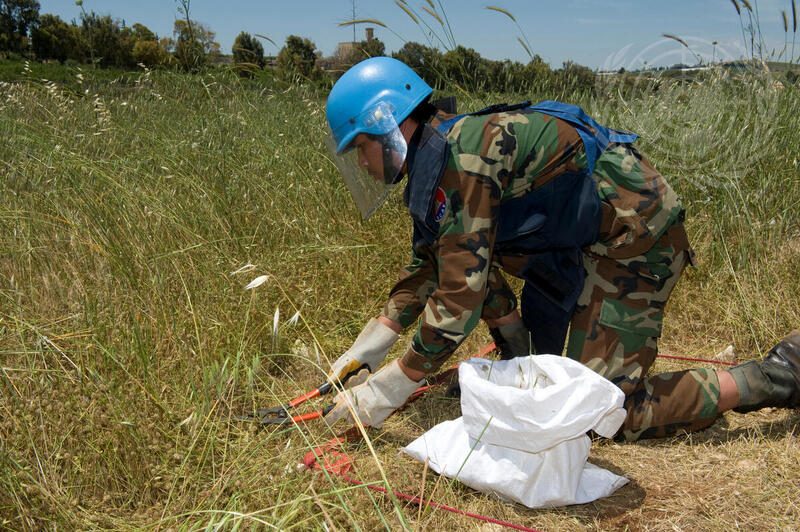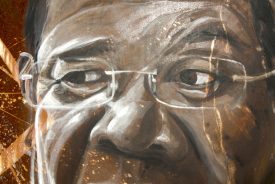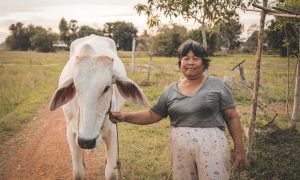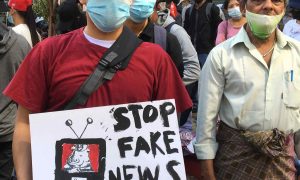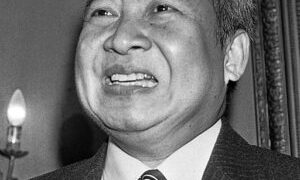Click here to go to read in Khmer
This year marks the 30th anniversary since the signing of the Paris Peace Agreements (PPA) between the four Cambodian factions and representatives from 18 other nations. The agreements were undoubtedly an essential element in paving the way for the United Nations Transitional Authority in Cambodia (UNTAC). This peacekeeping mission operated between 1992 and 1993, and was tasked with disarming the rival factions, returning refugees to their homes, and holding fair and free elections. The presence of UNTAC in Cambodia was the result of long negotiations that lasted more than ten years.
François Mitterrand, President of France during the formation of the UNTAC, remarked in the glittering reception hall that “A dark page of history has been turned and Cambodia is about to resume its place in the world’’.
Former Secretary-General of the United Nations, Javier Pérez de Cuéllar declared that “UNTAC will be probably the biggest and most complex mission in the history of the United Nations and urged the international community to assist in Cambodia’s reconstruction”.
According to Yasushi Akashi, the Special Representative of the Secretary-General of the UNTAC in Cambodia, UNTAC consisted of about 15,900 military members, 3,600 civilian police, 1,200 international civilian staff and 400 UN volunteers. The arrival of UNTAC was hailed by the local population as they believed that UNTAC would help to bring long-lasting peace.
In a letter filed in the UN archives of Radio UNTAC, Mr. Sothea, a citizen of Cambodia, declared “I was very excited to see the presence of UNTAC troops as they came to provide security for the Cambodian people’’ (click here to download the transcript of this broadcast in Khmer).
This acceptance was of the utmost importance in light of the previous 30 years. Prior to the conclusion of the PPAs, the country had suffered from social fragmentation, deep conflicts and political turmoil. Cambodian people faced unspeakable sufferings from a full-scale civil war between the Khmer Republic and the Khmer Rouge; the arrival of Pol Pot regime; and fighting between the People’s Republic of Kampuchea and resistance factions along the Cambodian-Thai border. On October 23, 1991, the Paris Peace Agreements were signed, bringing an end to a long era of violence and assisting all disputing parties in achieving peace, stability, and democracy by political reconciliation. PPAs were based entirely on the understanding that old wounds, however painful, must be healed forever (click here to download the transcript of this broadcast in Khmer).
In light of the lofty ambitions ushered in under the PPAs, it is crucial to pause for reflection and consider the legacy it continues to build.
Looking back to the 1990s, and the United Nations Peacekeeping Operation that followed, we can consider it a mixed legacy. On the negative side, the operation failed to disarm the Khmer Rouge, which resulted in political violence. Benny Widyono, a former UN-appointed Governor of Siem Reap Province, and author of Dancing In Shadows, explained that the Khmer Rouge escalated their strategy of noncooperation by launching incessant attacks on UNTAC and Cambodian factions. Evidently, during the night of 15 to 16 May-1993, the National Army of Democratic Kampuchea fired a few rounds of artillery that landed in the vicinity of Siem Reap airport (click here to download the transcript of this broadcast in Khmer).
In addition, the massive influx of foreign personnel that came as a result of UNTAC spawned a far-reaching consequence on the local culture and customs and introduced social issues of prostitution and HIV/AIDS. The rate of HIV/AIDS infection increased in 1992. There were also frequent complaints of misconduct by soldiers and police attached to the UN peacekeepers, including the sexual harassment of women and the mistreatment of locals. This type of illegal activities conducted by UN peacekeepers in the host country is known as the “dark side’’ of UN peacekeeping.
Despite these critical appraisals, it cannot be denied that during its 18-month mandate, the peacekeeping operation in Cambodia also produced positive outcomes including the conduct of free and fair general elections—which resulted in the successful formation of a new government of Cambodia—as well as humanitarian aid and refugee repatriation. As highlighted in the archive of the UN, Mr. Akashi said that UNTAC could be proud of two major achievements. The first of these was the registration of more than 4.6 million Cambodian people for the election. UNTAC’s second major achievement was the repatriation of almost all of the 370 000 refugees who fled their homeland during Cambodia’s two decades of conflict (click here to download the transcript of this broadcast in Khmer). The United Nations Peacekeeping Operation was intended to assist the Cambodian people in carrying out their obligations under the Paris Peace Agreements and achieving a future of peace, stability and self-determination.
Akashi described the United Nations Peacekeeping Operation in Cambodia as prominent proof to the world that a prolonged conflict can be resolved and seemingly irreconcilable views can be reconciled. Cambodia, he said, would serve as a model and a shining example for other UN member states.
By achieving peace and political stability through win-win policy, Cambodia was able to make its first contribution to a UN peacekeeping mission in 2006. Cambodia has gone from requiring peacekeepers to contributing more than 7,000 troops specialising in de-mining and engineering to work in the Central African Republic, Sudan, South Sudan, Chad, Syria, Cyprus, Lebanon and Mali. Cambodia, moreover, is the third largest contributor of peacekeeping troops in Southeast Asia, and is internationally ranked 27th out of 122 troop-contributing countries.
Cambodia haunted by mistakes of interventions past
What we see today in Cambodia is a direct outcome of the events of 1997, and the world’s feeble response then.
More importantly, this support for global peace and security has been widely recognized by the UN. Kosal Malinda, spokeswoman for the National Centre for Peacekeeping Forces and Explosive Remnants of War Clearance, has said Cambodia should be proud of its achievements. As a small state, Cambodia is well positioned through participation in multilateral engagements under the UN framework to develop its international reputation. In 2017, Secretary General António Guterres thanked Cambodia for its contributions to UN peacekeeping operations, in addition to assuring future cooperation.
However, there are a wealth of challenges for Cambodia in its contributions to UN’s peacekeeping missions, including the language barrier, limited access to equipment needed, and the complexity of operations in terms of structure, mission, and mandate. These may lead to difficulties for Cambodian troops in carrying out missions effectively.
The Cambodian government should continue contributing to protecting global peace, stability and security through participating in UNPKO if needed, and extend cooperation on joint exercises and training with a view to improving Cambodian peacekeeping capability and its talent pool. In this way, the legacy of UNTAC can be continued, through contributions to peacekeeping and peacebuilding in other nations.
កេរដំណែលនៃកិច្ចព្រមព្រៀងសន្តិភាពទីក្រុងប៉ារីស៖ ការរក្សាសន្តិភាពរបស់អង្គការសហប្រជាជាតិ
ឆ្នាំនេះគឺជាខួបទី ៣០ នៃការចុះហត្ថលេខាលើកិច្ចព្រមព្រៀងសន្តិភាពទីក្រុងប៉ារីសរវាងភាគីទាំង ៤ នៅកម្ពុជានិងតំណាងមកពី ១៨ ប្រទេសផ្សេងទៀត។ កិច្ចព្រមព្រៀងទាំងនោះគឺជាធាតុសំខាន់ក្នុងការត្រួសត្រាយផ្លូវសម្រាប់អាជ្ញាធរបណ្តោះអាសន្នអង្គការសហប្រជាជាតិប្រចាំនៅកម្ពុជា (អ៊ុនតាក់) ។ បេសកកម្មរក្សាសន្តិភាពនេះបានដំណើរការនៅចន្លោះឆ្នាំ ១៩៩២ និង ១៩៩៣ ហើយមានភារកិច្ចដកហូតអាវុធពីភាគីប្រជែងនៃជម្លោះ, ការបញ្ជូនជនភៀសខ្លួនទៅផ្ទះរបស់ពួកគេវិញនិងរៀបចំការបោះឆ្នោតដោយសេរីនិងយុត្តិធម៌។ វត្តមានរបស់អ៊ុនតាក់នៅកម្ពុជាគឺជាលទ្ធផលនៃការចរចាដ៏យូរអង្វែងដែលមានរយៈពេលជាងដប់ឆ្នាំ។
ក្នុងកំឡុងពេលបង្កើតអ៊ុនតាក់ ប្រធានាធិបតីបារាំង លោក ហ្វ្រង់ស័រ មីតតេរ៉ង់ (François Mitterrand) បានពោលនៅក្នុងសាលស្វាគមន៍ដ៏ត្រចះត្រចង់ថា “ទំព័រប្រវត្តិសាស្រ្តដ៏ខ្មៅងងឹតមួយត្រូវបានផ្លាស់ប្តូរ ហើយប្រទេសកម្ពុជានឹងចាប់ផ្តើមមានវត្តមានរបស់ខ្លួនឡើងវិញនៅក្នុងពិភពលោក”។
អតីតអគ្គលេខាធិការអង្គការសហប្រជាជាតិ លោក ហ្សាវីយ័រ ពែរេហ្ស ដឺ កូអេឡា (Javier Pérez de Cuéllar) បានប្រកាសថា “អ៊ុនតាក់ប្រហែលជាបេសកកម្មដ៏ធំនិងស្មុគស្មាញបំផុតនៅក្នុងប្រវត្តិសាស្ត្រអង្គការសហប្រជាជាតិ ហើយបានជំរុញឱ្យសហគមន៍អន្តរជាតិជួយក្នុងការកសាងប្រទេសកម្ពុជាឡើងវិញ”។
យោងតាម លោក យ៉ាស៊ូស៊ី អាកាស៊ី (Yasushi Akashi) ដែលជាតំណាងពិសេសរបស់អគ្គលេខាធិការអ៊ុនតាក់ប្រចាំនៅកម្ពុជា, អ៊ុនតាក់មានសមាជិកយោធាប្រហែល ១៥៩០០ នាក់, ប៉ូលីសចំនួន ៣៦០០ នាក់, បុគ្គលិកស៊ីវិលអន្តរជាតិចំនួន ១២០០ នាក់និងអ្នកស្ម័គ្រចិត្តអង្គការសហប្រជាជាតិចំនួន ៤០០ នាក់។ ការមកដល់របស់អ៊ុនតាក់ត្រូវបានប្រជាជនក្នុងស្រុកអបអរសាទរពីព្រោះពួកគេជឿជាក់ថាអ៊ុនតាក់នឹងជួយនាំមកនូវសន្តិភាពយូរអង្វែង។
នៅក្នុងលិខិតមួយដែលដាក់នៅមូលដ្ឋាននៃបណ្ណាសារដ្ឋានរបស់វិទ្យុអ៊ុនតាក់របស់អង្គការសហប្រជាជាតិ លោក សុធា ដែលជាប្រជាពលរដ្ឋខ្មែរម្នាក់បានប្រកាសថា “ខ្ញុំពិតជារំភើបណាស់ដែលបានឃើញវត្តមានកងទ័ពអ៊ុនតាក់ ខណៈពួកគេមកការពារសន្តិសុខជូនប្រជាជនកម្ពុជា”។. (click here to download the transcript of this broadcast in Khmer)
ការទទួលយកនេះមានសារៈសំខាន់បំផុតកាលពី ៣០ ឆ្នាំមុន។ មុននឹងមានកិច្ចព្រមព្រៀងសន្តិភាពទីក្រុងប៉ារីស ប្រទេសកម្ពុជានបានទទួលរងនូវការបែកបាក់សង្គម, ទំនាស់ស៊ីជម្រៅនិងវិបត្តិនយោបាយធ្ងន់ធ្ងរ។ ប្រជាជនកម្ពុជាប្រឈមមុខនឹងការឈឺចាប់ដែលមិនអាចនិយាយបានពីសង្គ្រាមស៊ីវិលទ្រង់ទ្រាយធំរវាងសាធារណរដ្ឋខ្មែរនិងខ្មែរក្រហម, ការកកើតនៃរបប ប៉ុល ពត និងការប្រយុទ្ធគ្នារវាងសាធារណៈរដ្ឋប្រជាមានិតកម្ពុជានិងក្រុមតស៊ូនៅតាមបណ្តោយព្រំដែនកម្ពុជា-ថៃ នៅថ្ងៃទី២៣ ខែតុលា ឆ្នាំ១៩៩១ កិច្ចព្រមព្រៀងសន្តិភាពទីក្រុងប៉ារីសត្រូវបានចុះ ហត្ថលេខាដោយបញ្ចប់ការប្រើអំពើហិង្សាយូរអង្វែងនិងជួយភាគីជម្លោះទាំងអស់ក្នុងការសម្រេចបាននូវសន្តិភាព, ស្ថិរភាព និងលទ្ធិប្រជាធិបតេយ្យតាមរយៈការផ្សះផ្សានយោបាយ។ កិច្ចព្រមព្រៀងសន្តិភាពទីក្រុងប៉ារីសត្រូវបានផ្អែកលើការយល់ដឹងថាស្នាមរបួសចាស់ទោះឈឺចាប់យ៉ាងណាក៏ត្រូវតែព្យាបាលឱ្យជាសះស្បើយជារៀងរហូត។(click here to download the transcript of this broadcast in Khmer)
ដោយផ្អែកលើមហិច្ឆតាដ៏ធំធេងនៃកិច្ចព្រមព្រៀងសន្តិភាពទីក្រុងប៉ារីស វាមានសារៈសំខាន់ណាស់ក្នុងការផ្អាកដើម្បីឆ្លុះបញ្ចាំងហើយពិចារណាពីកេរដំណែលដែលបន្តកសាង។
ក្រឡេកមើលទៅក្រោយទសវត្សរ៍ឆ្នាំ១៩៩០ និងប្រតិបត្តិការរក្សាសន្តិភាពរបស់អង្គការសហប្រជាជាតិដែលមានបន្តមក យើងអាចចាត់ទុកថាវាជាមរតកចម្រុះ។ នៅផ្នែកអវិជ្ជមាន ប្រតិបត្តិការបានបរាជ័យក្នុងការដកហូតអាវុធខ្មែរក្រហមដែលបណ្តាលឱ្យមានអំពើហិង្សានយោបាយ។ លោក ប៊ែននី វីដ្យូណូ (Benny Widyono) អតីតអភិបាលខេត្តសៀមរាបដែលត្រូវបានតែងតាំងដោយអង្គការសហប្រជាជាតិនិងជាអ្នកនិពន្ធសៀវភៅដែលមានចំណងជើងថា “ការរាំនៅក្នុងស្រមោល” បានពន្យល់ថាខ្មែរក្រហមបានបង្កើនយុទ្ធសាស្ត្រមិនសហការគ្នាដោយបើកការវាយប្រហារមិនឈប់ឈរលើអ៊ុនតាក់និងភាគីកម្ពុជាដទៃទៀត។ ជាក់ស្តែងនៅយប់ថ្ងៃទី១៥ ដល់ថ្ងៃទី ១៦ ខែឧសភា ឆ្នាំ១៩៩៣ កងទ័ពជាតិនៃរបបកម្ពុជាប្រជាធិបតេយ្យបានបាញ់កាំភ្លើងធំពីរបីគ្រាប់ដែលបានធ្លាក់នៅក្បែរបរិវេណព្រលានយន្តហោះខេត្តសៀមរាប។ (click here to download the transcript of this broadcast in Khmer)
លើសពីនេះការហូរចូលយ៉ាងច្រើននៃបុគ្គលិកបរទេសដែលកើតឡើងដោយសារអ៊ុនតាក់បង្កើតបានផលជះយ៉ាងធំធេងលើវប្បធម៌និងទំនៀមទម្លាប់ក្នុងស្រុកនិងបាននាំឱ្យមានបញ្ហាសង្គមអំពើពេស្យាចារនិងជំងឺហ៊ីវ/អេដស៍។ អត្រានៃការឆ្លងមេរោគជំងឺហ៊ីវ/អេដស៍បានកើនឡើងក្នុងឆ្នាំ១៩៩២។ ហើយក៏មានការត្អូញត្អែរជាញឹកញាប់អំពីការប្រព្រឹត្តមិនត្រឹមត្រូវរបស់ទាហាននិងប៉ូលីសដែលជាអ្នករក្សាសន្តិភាពរបស់អង្គការសហប្រជាជាតិ រួមមានការយាយីផ្លូវភេទទៅលើស្ត្រីនិងការធ្វើបាបអ្នកស្រុក។ សកម្មភាពខុសច្បាប់ប្រភេទនេះធ្វើឡើងដោយអ្នករក្សាសន្តិភាពអង្គការសហប្រជាជាតិនៅក្នុងប្រទេសម្ចាស់ផ្ទះត្រូវបានគេស្គាល់ថាជា “ផ្នែកអន្ធិកា”នៃការរក្សាសន្តិភាពរបស់អង្គការសហប្រជាជាតិ។
ទោះបីជាមានការវាយតម្លៃប្រកបដោយការរិះគន់ទាំងនេះក៏ដោយ គេក៏មិនអាចបដិសេធបានដែរថាក្នុងអំឡុងពេលអាណត្តិ ១៨ ខែនៃប្រតិបត្តិការរក្សាសន្តិភាពរបស់ខ្លួននៅកម្ពុជា អ៊ុនតាក់ក៏បានបង្កើតនូវលទ្ធផលវិជ្ជមានរួមមានការរៀបចំការបោះឆ្នោតសកលដោយសេរីត្រឹមត្រូវនិងយុត្តិធម៌ដែលជាលទ្ធផលនៃការបង្កើតរដ្ឋាភិបាលថ្មីរបស់កម្ពុជាប្រកបដោយជោគជ័យ ព្រមទាំងការផ្តល់ជំនួយមនុស្សធម៌និងការធ្វើមាតុភូមិនិវត្តន៍ជនភៀសខ្លួន។ ដូចដែលបានគូសបញ្ជាក់នៅក្នុងប័ណ្ណសាររបស់អង្គការសហប្រជាជាតិ លោក អាកាស៊ី បានមានប្រសាសន៍ថាអ៊ុនតាក់អាចមានមោទនភាពចំពោះសមិទ្ធផលធំៗពីរ។ ទីមួយគឺការចុះឈ្មោះប្រជាពលរដ្ឋខ្មែរជាង ៤,៦ លាននាក់សម្រាប់ការបោះឆ្នោត។ សមិទ្ធផលធំទី ២ របស់អ៊ុនតាក់គឺការធ្វើមាតុភូមិនិវត្តន៍ជនភៀសខ្លួន ៣៧០.០០០ នាក់ស្ទើរតែទាំងអស់ដែលបានភៀសខ្លួនចេញពីមាតុភូមិរបស់ពួកគេក្នុងកំឡុងពេលមានជម្លោះពីរទសវត្សរ៍នៅកម្ពុជា។(click here to download the transcript of this broadcast in Khmer)ប្រតិបត្តិការរក្សាសន្តិភាពរបស់អង្គការសហប្រជាជាតិមានគោលបំណងជួយប្រជាជនកម្ពុជាក្នុងការបំពេញកាតព្វកិច្ចរបស់ខ្លួនក្រោមកិច្ចព្រមព្រៀងសន្តិភាពទីក្រុងប៉ារីសនិងសម្រេចបានសន្តិភាព, ស្ថិរភាពនិងការស្វ័យសម្រេចសម្រាប់អនាគតរបស់ ខ្លួន។
លោក អាកាស៊ី បានពិពណ៌នាប្រតិបត្តិការរក្សាសន្តិភាពរបស់អង្គការសហប្រជាជាតិនៅកម្ពុជាថាជាភស្តុតាងលេចធ្លោដល់ពិភពលោកថាជម្លោះដែលអូសបន្លាយពេលអាចត្រូវបានដោះស្រាយ ហើយទស្សនៈដែលមើលទៅមិនអាចចុះសម្រុងគ្នាអាចផ្សះផ្សាបាន។ លោកបានមានប្រសាសន៍ថាប្រទេសកម្ពុជានឹងធ្វើជាគំរូនិងជាគំរូល្អសម្រាប់ប្រទេសជាសមាជិកអង្គការសហប្រជាជាតិដទៃទៀត។
ដោយសម្រេចបាននូវសន្តិភាពនិងស្ថិរភាពនយោបាយតាមរយៈគោលនយោបាយឈ្នះ-ឈ្នះ, ប្រទេសកម្ពុជាអាចរួមចំណែកលើកដំបូងរបស់ខ្លួនក្នុងបេសកកម្មរក្សាសន្តិភាពរបស់អង្គការសហប្រជាជាតិនៅឆ្នាំ ២០០៦។ កម្ពុជាបានចាកចេញពីការទាមទារឱ្យមានកងរក្សាសន្តិភាពដើម្បីរួមចំណែកផ្តល់កងកម្លាំងរក្សាសន្តិភាពជាង ៧០០០ នាក់ដែលមានជំនាញខាងដោះមីននិងវិស្វកម្មដើម្បីធ្វើការនៅប្រទេសសាធារណរដ្ឋអាហ្វ្រិកកណ្តាល, ស៊ូដង់, ស៊ូដង់ខាងត្បូង, ឆាដ, ស៊ីរី, ស៊ីប, លីបង់ និងម៉ាលី។ លើសពីនេះប្រទេសកម្ពុជាគឺជាអ្នករួមចំណែកធំបំផុតទី៣ នៃកងម្លាំងរក្សា សន្តិភាពនៅអាស៊ីអាគ្នេយ៍ ហើយត្រូវបានគេដាក់ចំណាត់ថ្នាក់អន្តរជាតិជាប្រទេសទី២៧ ក្នុងចំណោមប្រទេសចំនួន១២២ ដែលបានចូលរួមចំណែកក្នុងកងកម្លាំងរក្សាសន្តិភាព។
សំខាន់ជាងនេះទៅទៀត ការគាំទ្រនេះសម្រាប់សន្តិភាពនិងសន្តិសុខពិភពលោកត្រូវបានអង្គការសហប្រជាជាតិទទួលស្គាល់យ៉ាងទូលំទូលាយ។ លោកស្រី កុសល ម៉ាលីនដា ដែលអ្នកនាំពាក្យមជ្ឈមណ្ឌលជាតិដើម្បីកងកម្លាំងរក្សា សន្តិភាពនិងការបោសម្អាតសំណល់ជាតិផ្ទុះនៃសង្គ្រាមបានមានប្រសាសន៍ថាកម្ពុជាគួរតែមានមោទនភាពចំពោះសមិទ្ធផលរបស់ខ្លួន។ ក្នុងនាមជារដ្ឋតូចមួយ ប្រទេសកម្ពុជាមានតួនាទីយ៉ាងសំខាន់ក្នុងការចូលរួមក្នុងការចូលរួម ពហុភាគីក្រោមក្របខ័ណ្ឌអង្គការសហប្រជាជាតិដើម្បីបង្កើតកេរ្តិ៍ឈ្មោះរបស់ខ្លួនក្នុងឆាកអន្តរជាតិ។ នៅឆ្នាំ២០១៧ អគ្គលេខាធិការអង្គការសហប្រជាជាតិ លោក អាន់តូនីយ៉ូ ហ្គូទែរែស បានអរគុណប្រទេសកម្ពុជាចំពោះការរួមចំណែករបស់ខ្លួនចំពោះប្រតិបត្តិការរក្សាសន្តិភាពរបស់អង្គការសហប្រជាជាតិបន្ថែមលើការធានាកិច្ចសហប្រតិបត្តិការពេល អនាគត។
ទោះយ៉ាងណាក៏ដោយ មានបញ្ហាប្រឈមជាច្រើនសម្រាប់កម្ពុជាក្នុងការរួមចំណែករបស់ខ្លួនក្នុងបេសកកម្មរក្សា សន្តិភាពរបស់អង្គការសហប្រជាជាតិរួមទាំងឧបសគ្គភាសា, លទ្ធភាពទទួលបានឧបករណ៍ដែលត្រូវការមានកម្រិត និងភាពស្មុគស្មាញនៃប្រតិបត្តិការទាក់ទងនឹងរចនាសម្ព័ន្ធបេសកកម្មនិងអាណត្តិរបស់ខ្លួន។ ចំណុចទាំងនេះអាចនាំឱ្យមានការលំបាកដល់កងកម្លាំងកម្ពុជាក្នុងការបំពេញបេសកកម្មប្រកបដោយប្រសិទ្ធភាព។
រដ្ឋាភិបាលកម្ពុជាគួរតែបន្តរួមចំណែកការពារសន្តិភាព, ស្ថិរភាពនិងសន្តិសុខពិភពលោកតាមរយៈការចូលរួមក្នុង UNPKO បើចាំបាច់និងពង្រីកកិច្ចសហប្រតិបត្តិការលើការធ្វើសមយុទ្ធនិងការបណ្តុះបណ្តាលរួមគ្នាក្នុងគោលបំណងពង្រឹងសមត្ថភាពរក្សាសន្តិភាពកម្ពុជានិងសមត្ថភាពទេពកោសល្យរបស់ខ្លួន។ តាមវិធីនេះកេរដំណែលរបស់អ៊ុនតាក់អាចត្រូវបានបន្តតាមរយៈការរួមចំណែកដល់ការរក្សាសន្តិភាពនិងការកសាងសន្តិភាពនៅក្នុងប្រទេសផ្សេងទៀត៕
 Facebook
Facebook  Twitter
Twitter  Soundcloud
Soundcloud  Youtube
Youtube  Rss
Rss 